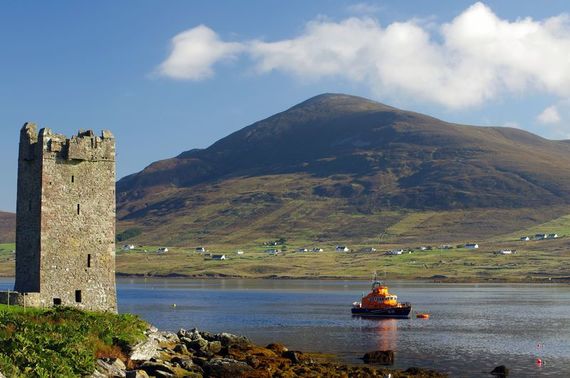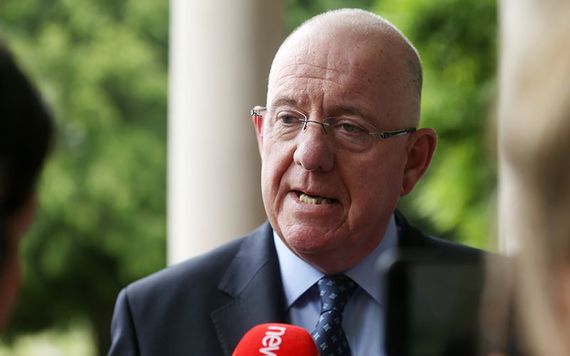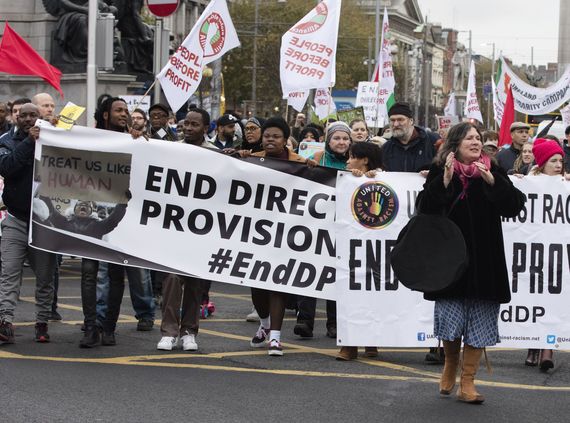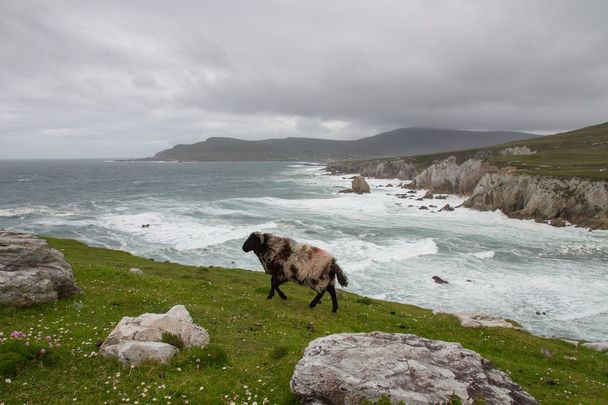Island of 2,000 people off west of Ireland coast the newest target of failed immigrant solution Direct Provision exemplifying why Ireland's system needs a full overhaul.
Achill Island off the far west coast of Ireland is a bleak place in winter. The rain rolls in off the Atlantic and there are entire days when the mist never lifts.
Although it's connected to the mainland by a bridge, at this time of year the boggy, barren landscape can make the island feel like one of the most remote places on earth.
Apart from tourism in the summer when the weather and the island can be glorious, there are few jobs. There are a couple of small hotels and lots of B&Bs. There is a small industrial park run with state support, but many of the 2,000 people on the island live on small farms and supplement that income by catering for the summer tourists, or they work on the mainland.
Read more: Is the destitute Dublin of 1913 back again in 2019?
Despite Achill's questionable suitability, however, last week the island became the latest location where the Irish authorities are trying to place asylum seekers. This provoked a blockading protest by local people outside the hotel where the migrants were to be housed, just as similar developments have done in a number of small towns around Ireland recently. And once again the confrontation made headlines here, even pushing Brexit and the start of the U.K. election off the front pages last weekend.
Given the vital importance of this U.K. election to Ireland, devoting the front pages instead to a local issue on an island off the Mayo coast might seem like an odd news choice. But not so. This issue has become a national talking point, one that is arousing argument, fear, division, and anger across the country.
You will not be surprised to learn that most newspapers disapproved of the protest in Achill. Over the past week officialdom and all of the media here joined in near-unanimous criticism, with appeals to the protestors to consider what the migrants may have suffered before they got to Ireland, and to live up to our national responsibility to help them, as well as living up to our reputation as the country of a hundred thousand welcomes.

The stunning Achill Island, County Mayo.
The subtext of this outpouring of liberal disapproval was that the protestors in Achill were ignorant or racist, or both. They were being influenced by outside right-wing groups.
Their claim that the hotel and the isolated locality were unsuitable for migrants was simply a cover for racist fears. They were disgracing themselves and the country, we were told repeatedly.
But of course, the situation is not as simple as that, despite the wave of patronizing disapproval. The questions raised by the local people do not deserve to be dismissed or ridiculed. They had every right to be concerned about what was being foisted on them, without any consultation.
The hotel is located near a village of around 60 people, and the plan is that it will house 38 asylum seekers. Given the disproportion of this, it is legitimate to ask what effect this could have on the local community.
Read more: Small towns bear brunt of Irish asylum system
As in other towns faced with this issue, there was no offer of extra state resources to help. As usual, the local people would be left to cope as best they can.
And it also seemed fair to ask how the migrants themselves would feel in such a remote place where there are no jobs and little to do. The hotel is on the far side of Achill with nothing else around; the nearest shop is two miles away.
Would they really want to be put in such a remote location? Instead of addressing these concerns, the questions were glossed over and left unanswered last week.
In addition to the lack of any advance consultation, the authorities were also being less than honest with information. At first, it was said that only 13 female asylum seekers would be arriving.
Minister for Justice Charlie Flanagan (his department runs the asylum seeker process) made an emotional appeal to the protestors asking them to consider how these "vulnerable women" would feel if they were faced with a picket at the hotel. The same line was used across the media.

Minister for Justice Charlie Flanagan.
It only emerged subsequently when locals were shown an official email to the hotel owner that the plan was to house 38 asylum seekers there. This strategy of revealing as little as possible in advance is the same approach used elsewhere over the past year by the authorities as they attempt to provide accommodation for asylum seekers in small towns around the country.
The strategy is to withhold information until a deal has been completed with the owner of a local hotel, the migrants have begun to arrive, and the situation is a fait accompli that is difficult to reverse. To say it's unfair to local people is putting it mildly.
Why is the government doing it? First of all, there has been a spike in the number of asylum seekers arriving here—it's up 60 percent over the past year.
The second point is that all the Direct Provision centers, over 30 of them around the country, are full. These are the main centers here where close to 8,000 asylum seekers are currently being housed while they wait for their applications to be decided.
So new asylum seekers arriving over the past year have had to be put up in so-called emergency accommodation in smaller hotels and apartment buildings which are often vacant in struggling rural towns and villages around the country, and which are hired by the state to provide the service. It's a convenient way for the government to solve the problem, and it's a guaranteed income for the owners who may have few other alternatives in depressed small towns. Close to 2,000 asylum seekers are currently being housed in this way.
This emergency accommodation arrangement is supposed to be temporary until space can be found in the existing Direct Provision centers, or new ones can be developed. In the case of the Achill hotel, the local people have been told it is a temporary arrangement for three months.
The reality is, however, that there is nothing to prevent this from being extended. The hotel could revert to its tourism business next summer, but where will the migrant residents go then?
If new arrivals of asylum seekers keep coming at the present rate over the next few years, finding accommodation for them is always going to be a problem. The situation is made even more difficult because of the housing crisis here.
The difficulty and expense of finding a home here even for Irish people mean that asylum seekers in Direct Provision who have been given permission to stay in Ireland cannot move out because they cannot find anywhere to live. The whole Direct Provision system is now clogged up and we have reached a crisis point.

A rally against Direct Provision in Dublin.
People in many small towns are refusing to become the state's easy solution to the problem. We have seen intense opposition in a number of places, with hotels being burned and non-stop protests leading to plans being abandoned.
There have also been a few examples of towns where a limited number of asylum seekers were accepted but the national mood—and Achill is just the latest example—is strongly negative, despite the attempts by the media and the authorities to make local people feel guilty and ashamed.
There is a wider context to all of this, which is the inept system we have for dealing with asylum applications here. It's still very slow, although applications are now dealt with in less than two years rather than the many years it had been taking.
The ongoing problem is that a decision is never the end of the road for applicants. Instead, they launch repeated legal challenges—all funded by free legal aid—a process that can extend their stay by years. During this time they put down roots and may have children, which makes it more difficult to expel them.
The statistics show that over 80 percent of failed asylum seekers here never leave. Forced deportations almost never happen, and when they are attempted they are turned into an emotive circus by the media.
The fact that Ireland is a relatively benign place for asylum seekers is well known internationally and explains why they pass through other safe countries to get here.
This situation attracts people who are economic migrants rather than asylum seekers, which can be seen clearly in the figures for the past year or two. The top countries of origin last year were Albania and Georgia, countries that are categorized as safe by the EU.
Applications from sub-Saharan countries like Nigeria (well away from the wars in North Africa and the Middle East) remain high. The vast majority of all these applicants are economic migrants rather than asylum seekers.
This is reflected in the fact that almost all applications here from Syrians last year were accepted, and almost all from Albanians and Georgians were rejected. But the problem remains that the vast majority end up staying here anyway. This probably explains why there was a 26 percent increase in the number of new asylum seekers in Ireland in 2018, despite a decrease in the number applying in other EU countries.
The result of all this is that our Direct Provision system has been overwhelmed and the authorities are now desperately looking for emergency accommodation to house asylum seekers in small towns around Ireland where there are underused hotels and other buildings.
But the solution does not lie in overcoming local opposition. It lies in a complete overhaul of our system for assessing applicants, differentiating between genuine asylum seekers and economic migrants, and then speedily removing those who don't qualify.
If we don't do that we can force migrants into every village in Ireland and we still won't solve the problem.
Read more: Irish man arrested after 15 people found in lorry




Comments